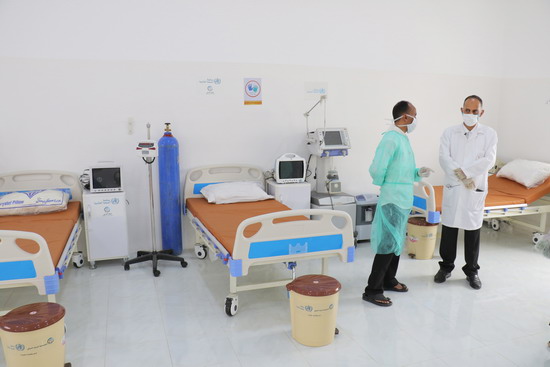 13 May 2020 — Existing vulnerabilities, an already fragile health system and limited availability of medical supplies makes the risk COVID-19 poses to public health in Yemen unique, and mitigating the pandemic's effects all the more critical. With 24 million people in need of humanitarian assistance and millions surviving on emergency food aid, the magnitude of chronic malnutrition in the Yemeni population has become precarious, immune systems against infectious disease are lowered while levels of vulnerability heightened.
13 May 2020 — Existing vulnerabilities, an already fragile health system and limited availability of medical supplies makes the risk COVID-19 poses to public health in Yemen unique, and mitigating the pandemic's effects all the more critical. With 24 million people in need of humanitarian assistance and millions surviving on emergency food aid, the magnitude of chronic malnutrition in the Yemeni population has become precarious, immune systems against infectious disease are lowered while levels of vulnerability heightened.
While dealing with the pandemic, the already devastated health system in Yemen continues to be ravaged by multiple overlapping infectious disease outbreaks, such as cholera and diphtheria, which still require an emergency response.
Health care workers on the frontlines of conflict are trained to manage COVID-19 patients
As the conflict in Yemen enters its sixth year, the myriad of infectious diseases has been another battle the population has had to face. One of the last countries to confirm COVID-19 cases, Yemen has been in preparation for weeks. On 10 April the first case of the virus was declared in Hadramout, now weeks in, the cases are now at 35, including 7 deaths and one recovery.
“We have heard about the virus — it is all over the news, you can’t help but be fearful. Here in Yemen, the resources are few, especially in Saada, an active frontline,” said Dr Mohammed Al Naggar, WHO hub manager in Saada.
With the looming threat of COVID-19 now spreading across the country, health care workers are focused on prevention and clinical case management of the virus.
“We know the resources are few, they are not enough, but we are doing the best we can with what we have, and right now, we are leveraging the knowledge of medical experts in the country to train health care workers on how to manage this virus, without getting infected themselves,” said Mohammad Al Naggar.
In April, COVID-19 clinical case management trainings were conducted in Saada, for health care workers staffing the Al Talh isolation centre in Sa’ada, ranging from doctors and nurses to medical assistants. This 4-day training covered various types of cases health care workers may see present at hospital so that they are prepared to treat or manage the case.
“We are afraid—but we must do something, and we are. We need people who understand what to do when this disease comes to our hospital,” he continues.
“This disease has declared war on us—and with small steps like this, we are fighting back.“








